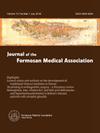Integrating traditional Chinese Medicine reduced the risk of hip fracture in patients with dementia.
IF 2.6
3区 医学
Q1 MEDICINE, GENERAL & INTERNAL
引用次数: 0
Abstract
BACKGROUND/PURPOSE The high incidence of hip fracture is an important problem among dementia patients because of their higher risk of falls and balance deficits due to a lack of physical activity. The aim of this study was to investigate whether traditional Chinese medicine (TCM) therapy could reduce the risk of hip fracture in dementia patients. METHODS We identified 38,071 patients who were first diagnosed with dementia from January 1, 2000, to December 31, 2017, from the database of the 2000 Longitudinal Generation Tracking Database (LGTD 2000) provided by the Health and Welfare Data Science Center (HWDC) in Taiwan. Patients who received TCM treatment after the initial diagnosis of dementia were assigned to the TCM group, and patients who never received TCM treatment were assigned to the non-TCM group. After performing 1:1 propensity score matching (1:1) based on age, sex, comorbidities and medication between the TCM and non-TCM groups, there were 902 patients in each group. Patients were followed up to December 31, 2018, and incidences of hip fracture after the initial diagnosis of dementia between the two groups were compared with Cox regression analysis. RESULTS Ninety-four patients in the non-TCM group (10.42%) and 58 patients in the TCM group (6.43%) suffered from hip fracture during the follow-up period. Patients in the TCM group had a lower incidence of hip fracture than those in the non-TCM group (adjusted hazard ratio = 0.54, 95% confidence interval = 0.38-0.76). CONCLUSIONS Integrating TCM health care for dementia patients might reduce the risk of hip fracture.中西医结合降低了痴呆症患者髋部骨折的风险。
背景/目的痴呆症患者由于缺乏体力活动,跌倒和平衡障碍的风险较高,因此髋部骨折的发病率很高,这是痴呆症患者面临的一个重要问题。本研究的目的是调查传统中医治疗是否能降低痴呆症患者髋部骨折的风险。方法我们从台湾卫生福利数据科学中心(HWDC)提供的2000年纵向世代追踪数据库(LGTD 2000)中找到了38071名在2000年1月1日至2017年12月31日期间首次被诊断为痴呆症的患者。初诊痴呆后接受中医治疗的患者被分配到中医组,从未接受中医治疗的患者被分配到非中医组。根据年龄、性别、合并症和用药情况在中医组和非中医组之间进行 1:1 倾向性评分匹配(1:1)后,每组各有 902 名患者。对患者进行随访至2018年12月31日,并通过Cox回归分析比较两组患者在初次诊断为痴呆症后的髋部骨折发生率。中医组患者的髋部骨折发生率低于非中医组患者(调整后危险比 = 0.54,95% 置信区间 = 0.38-0.76)。
本文章由计算机程序翻译,如有差异,请以英文原文为准。
求助全文
约1分钟内获得全文
求助全文
来源期刊
CiteScore
6.50
自引率
6.20%
发文量
381
审稿时长
57 days
期刊介绍:
Journal of the Formosan Medical Association (JFMA), published continuously since 1902, is an open access international general medical journal of the Formosan Medical Association based in Taipei, Taiwan. It is indexed in Current Contents/ Clinical Medicine, Medline, ciSearch, CAB Abstracts, Embase, SIIC Data Bases, Research Alert, BIOSIS, Biological Abstracts, Scopus and ScienceDirect.
As a general medical journal, research related to clinical practice and research in all fields of medicine and related disciplines are considered for publication. Article types considered include perspectives, reviews, original papers, case reports, brief communications, correspondence and letters to the editor.

 求助内容:
求助内容: 应助结果提醒方式:
应助结果提醒方式:


